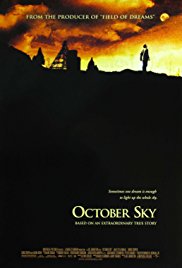Discussion Questions Relating to Ethical Issues will facilitate the use of this film to teach ethical principles and critical viewing. Additional questions are set out below.
RESPONSIBILITY
(Do what you are supposed to do; Persevere: keep on trying!; Always do your best; Use self-control; Be self-disciplined; Think before you act — consider the consequences; Be accountable for your choices)
1. To persevere is to continue on a course of action despite difficulties and lack of success. Cite examples of perseverance in this film.
Suggested Response:
In this movie, the Rocket Boys kept on trying to perfect their rockets despite their initial lack of success. The theme of perseverance also relates to the U.S. space program which, despite its failures at the beginning, eventually triumphed over the Russians in most areas of space exploration. See also the quote from Daniel Goldin, former NASA administrator, in suggested response to Discussion Question #2.
2. Put yourself in the position of Homer in this story. Your father is badly injured and cannot work. Someone must work in the mine if the family is to avoid eviction from company housing and being forced to move out of the town. Your brother is on track to escape to college on a football scholarship, but he must finish school. He will never have another chance to go to college. If you go to work in the mine you will probably do well and rise to a position in management, just like your father. What would you do if you were in Homer’s position?
Suggested Response:
This question tests the limits of responsibility and caring. Homer and his brother did have some responsibility to help the family keep a home. This didn’t require one of them to work only in the mine, but they did have to shoulder the burden or at least part of the burden their father could no longer carry. Homer, because he cared for his brother, didn’t want him to miss the chance to go to college on an athletic scholarship. There is also a sense that Homer knew that, while going into the mine was risky, his father had made a good career there. Homer would probably also rise to a manager’s position. Given these facts, what Homer did was the most ethical thing to do based upon his responsibility to his family and his love for his brother. There are three other interesting points about this subplot. First, there are limits to what a child can be asked to do for the family. If going into the mine had been a complete dead-end for Homer, the answer to this question would be different. See, e.g., The Glass Menagerie. Second, the real Homer Hickam worked in the mine only for a summer during college. This subplot is one of the few parts of the movie that didn’t really happen and he disliked it. He commented, referring to the situation in which the Homer Hickam character in the movie dropped out of high school: “My parents would have lived in a tree before they would have ever let that happen!” This fact illustrates that there are many situations in which both parents and children have a responsibility. Third, compare the scene in which Homer must put his dreams aside and work in the mine to It’s A Wonderful Life, in which the leading character gave up his dreams of a career as an architect in New York so that his brother could attend college and yet he lived a “wonderful life”.
3. Homer’s brother was set to get a football scholarship which was the only way that, in the past, kids had gotten out of Coalwood and into the larger world. Did Homer’s older brother do the right thing to let Homer work in the coal mines so that the brother could continue on to college?
Suggested Response:
Yes. There is no responsibility not to accept the gifts or moral conduct of others. However, Homer’s brother did owe Homer a great debt.
CARING
(Be kind; Be compassionate and show you care; Express gratitude; Forgive others; Help people in need)
4. Name the characters in this film who honored the concept of “caring” and describe what they did that leads you to that conclusion.
Suggested Response:
The mother, because she always wanted what was best for her sons. The teacher who encouraged the Rocket Boys. The Rocket Boys, who unanimously chose Homer to go to the science fair. The Union members, including the machinists, and the people in Coalwood who encouraged and helped the Rocket Boys. Homer’s father, who finally came round. (See question below for more on Homer’s father.)
5. Who, in this film, had the most trouble practicing the concept of caring? What were the reasons? How did he or she resolve it?
Suggested Response:
Our vote goes to Homer’s father. At the beginning, he wanted Homer to work in the mine and eventually become a manager, like he was. He saw a lot of himself in Homer which is probably why he was so strict with the boy. When Homer started to branch out onto his own path, the father felt rejected and insecure. These are not appropriate feelings for a parent. Parents should recognize that children are not born to adopt their parents’ values wholesale, or to follow in their footsteps. Children must be allowed and encouraged to find the life that is right for them. That is the true gift of a caring parent. Eventually, Homer’s father endorsed the Rocket Boys’ efforts. In so doing, he recognized and fulfilled the love he had for his son. Homer’s father was forced to choose between his dream that Homer would work with him in the mine and what was best for his son. After some delay, he made the right choice.





